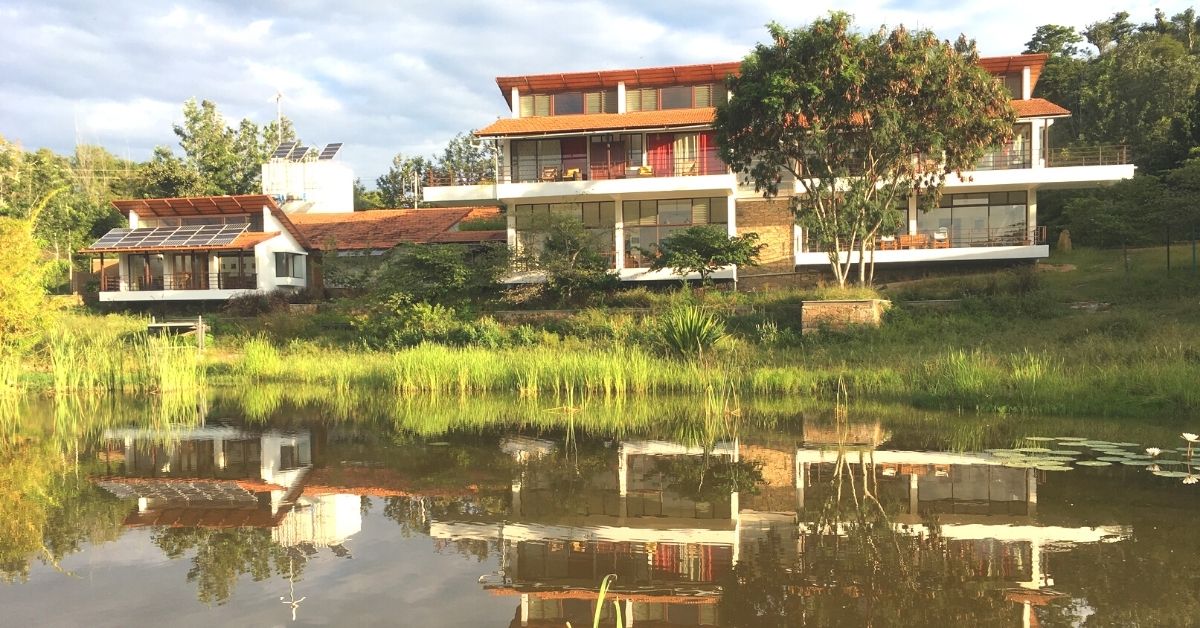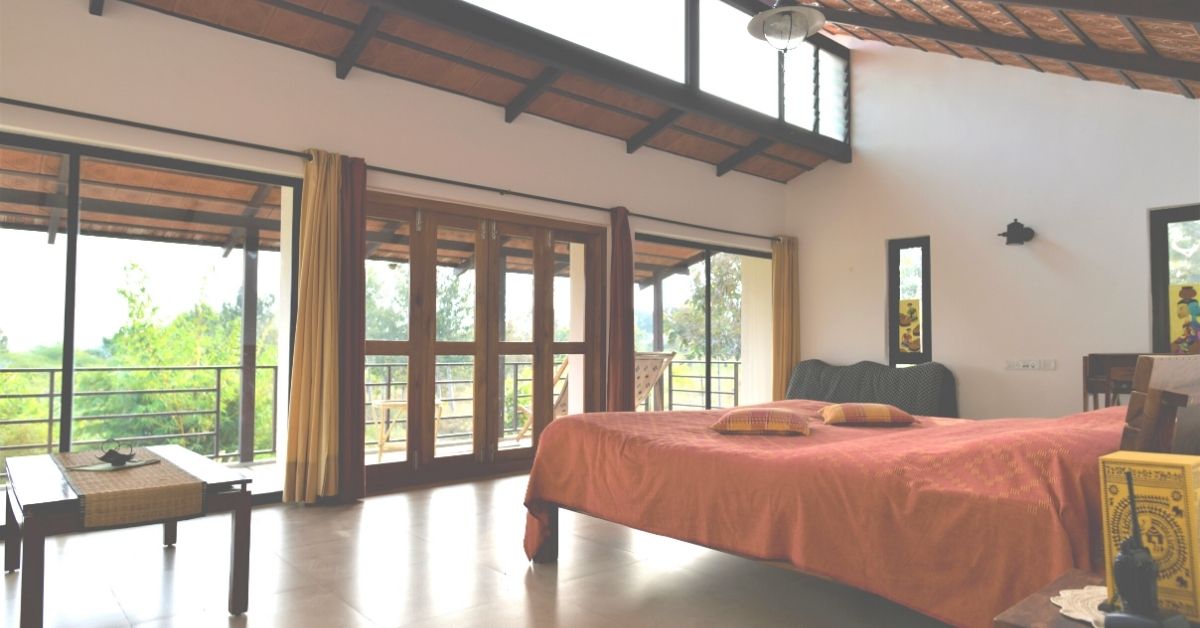Dhole’s Den, a 250 km drive from Bengaluru, may surprise you in its unique experience of hospitality. In this safari homestay, nestled in the midst of Bandipur, you’ll be greeted with a list of dos and don’ts, and a sharp focus on environment conservation and lowering your carbon footprint.
“We welcome our guests with the questions – ‘How green would you like to be?’ and ‘How small can our, and your, carbon footprint be?’ says Karthik Davey, who runs the homestay with his wife, Ingrid.
The 46-year-old says these questions have been helping the guests make mindful decisions regarding using resources in the eco-friendly homestay and adhering to nature-friendly practices since 2009. Dhole’s Den relies on solar energy and windmill energy to meet 95% of its energy requirements. Moreover, the stay composts its kitchen waste, recycles sewage water, and uses LED lights to reduce power consumption, among many eco-friendly measures.
These seemingly strict norms have not deterred any of the 15,000 visitors the property has seen so far. On the other hand, many tourists come back for several visits, and have made this abode their second home.
Imbibing minimalism and sustainability

“The homestay is adjacent to the Bandipur National Forest, which is home to tigers, elephants, leopards, peacocks, deer and other wild animals. We do not want to intrude their space nor cause harm to the environment,” Kartik tells The Better India.
“I want to discourage guests from remaining confined in their rooms and glued to the television with air conditioning on throughout their vacation. They should instead explore the Nilgiris, opt for safaris, take hikes amidst nature, and absorb it as much as they can,” he says, adding, “You have these luxuries in the urban setup, but what difference is there if you do the same when you’re surrounded by nature?”
Karthik says that a lot of thinking has gone into designing and creating the setup to reduce the overall carbon footprint. The name Dhole’s Den is derived from the Dhole, the Asiatic wild dog, Cuon Alpinus, an endangered species found in Bandipur.
Dhole’s Den offers only five living spaces – two Habitat rooms, and two Garden Mansion bungalows, and one Mountain Paradise bungalow – all with an emphasis on space, air, light and sight.
“The setup is created within five acres of land, with one artificial wetland and a kitchen garden. Only about 10% of the total area has been utilised for construction, and the rest remains open for natural plantation,” he adds.
Explaining the environment-friendly aspects of the property, Karthik says, “The bungalows are inspired by local architecture and use double thick walls with no RCC roofs. The rock walls are made entirely by locals of the tribal community, using interlocking bricks and least concrete.”
Most rooms have a minimalist design and furniture. “The rooms have been designed in a way that they are appropriately ventilated and exploit maximum natural light, hence reducing the burden on electricity during the day time. The roof of the rooms is around seven feet high, which helps in cooling, and in turn helps reduce the carbon footprint,” he says.
Karthik says the pathways allow the rainwater to seep through them, which recharges the groundwater level.

The eco-friendly features of this homestay include:
The wind-solar hybrid solution delivers the power required by the property.
Local trees and biodiversity gardens planted on the premises allow small fauna to survive.
Bio-Digester helps convert food waste to biogas.
Kitchen waste and organic material is converted to use as compost.
A rainwater harvesting system has been installed in all major areas of the property, and there is also a pond on the premises.
Herbal toiletries are provided to visitors in each room.
The plantation of high trees around the rooms provides natural cooling.
The wastewater is treated using root zone technology. It is a natural method to treat sewage where plants purify the water using microbes.
Degradable and biodegradable waste segregation.
A minimal generator is used (2.5 KVA) only for utmost emergency.
Empathy for wildlife
Guests are requested to abide by specific guidelines. “We insist that the guest use minimum electricity and use power from solar or wind. Towels are to be used for at least two days to reduce effluents in the soil. There is no 24×7 power supply, but we have a backup generator,” he says.
He adds that round the clock food service is unavailable. “Breakfast, lunch and dinner are served at designated times, and non-veg is offered only in the evening. The vegetables are sourced from an organic farm within the premises. Serving meat only once helps save on a long trip to fetch meat, which adds to the carbon footprint. The price of the mineral water bottle is capped high to discourage its use. Instead, we provide filtered water in steel bottles,” he says.

Karthik says that hot water is provided through solar geysers. “We allow only exterior cleaning of the car, such as the body and windows, and not a thorough one. It prevents the oil and other chemicals from polluting the earth. A special gift awaits the guest who goes the last mile to take their garbage from their rooms. We consider this as the highest form of involvement,” he says.
Karthik says that certain forest etiquettes are observed, ensuring minimal disturbance to wildlife.
“The check-in and check-out hours, as well as meals and safari timings are planned in a way to avoid inconvenience to wild animals. No loud music or late hour partying is allowed. Bright lights and coloured clothing are discouraged. Lights are switched off at 10 pm on the premises. However, there are no restrictions within the room,” he says.
Karthik adds the reasons for such adherence come as the homestay is graced by the presence of sloth bears, a variety of birds, reptiles and other wildlife. “Even the roar of the tiger and the growl of the leopard is never too far away,” he says.
“We believe that less is more, and in such a way, one doesn’t have to trample all over nature to explore its hidden gems,” he says, adding that his wife Ingrid also gifts soft toys made from upcycled clothes to the guests. “It sends a message about how beautiful things can be created by recycling discarded materials.
‘Humans and nature need each other’

Sunita Shanker, a Delhi-based fashion designer, says she visited the homestay first in 2017, and has since made it her second home. “I went with my husband and daughter in search of lesser-explored places and fell in love with the view of the Nilgiri mountains and living so close to nature,” she says.
Sunita describes Karthik as a friendly and chatty man, who makes the experience personal. “He was kind enough to pick us up, make special arrangements for our daughter’s birthday, and cook our favourite food. We visited in 2018 and 2019 to spend time watching deers wander in the green surroundings. The Daveys are our best friends now,” she says.
She adds that her daughter spent time dispersing seeds, enjoying organic food and connecting with nature. “These experiences are unavailable in cities, and it reminds us of how nature and humans need each other,” Sunita says, adding that as a takeaway, she tries growing organic food on her terrace garden.
Karthik says, “The aim is to imbibe values of sustainability and bring people close to nature. Humans must learn how to coexist with and respect the environment. This is my attempt to help them understand the same.”
Apart from inculcating the values of sustainability, Karthik supports a local school by providing assistance such as educational material, as well as conducting safari rides and educational talks to highlight the importance of forests.
For bookings, Karthick can be contacted here.
Edited by Divya Sethu
No comments:
Post a Comment